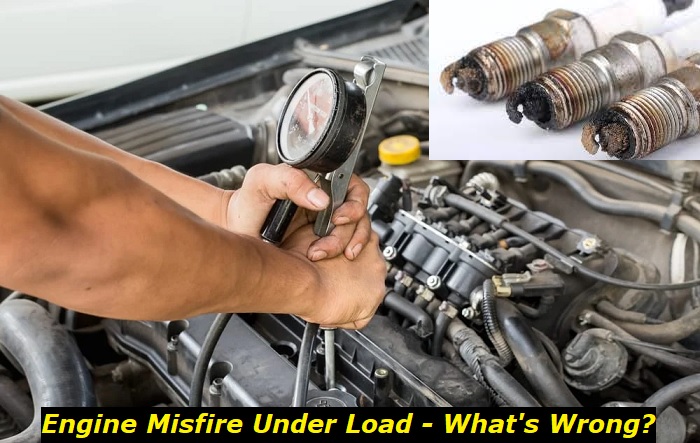Imagine this: you're driving along, and you start to push for a little more out of your engine. Maybe there's an open stretch, and you want to go a little faster, or you need to climb a hill. You press down on the accelerator and your engine starts to shake and sputter violently. You feel your engine's power drop and the car slows down. It feels like your engine is misfiring, and the problem gets worse when you try to accelerate.
Engine misfire highlights
- Level of importance:Medium
- Commonreasons:No spark, electrical problems, no fuel, low fuel pressure, injection issues, compression problems, internal engine damage
- DIY inspection:Possible but very complicated
- DIY repair:Impossible, in most cases
- Price for repair:$500 - $1,600
- Can you drive?Usually, yes
- Ways to fix:Locate the issue and let a professional mechanic fix it for you

What Is a Misfire?
An engine misfire happens when one or more of your engine's cylinders doesn't ignite the fuel properly. This is a problem because it causes the car to produce less power than it should. It also makes the engine run less smoothly and results in unburned fuel escaping into the exhaust system. This is could damage the engine if the problem is not dealt with on time.
For your engine to run efficiently, all of the cylinders need to fire with precise timing. Your engine has many different parts, such as the timing components, which ensure that this happens every cycle. When one or more cylinders don't fire completely when they should, then you have an engine misfire.
There are many different causes of engine misfires, and it's important to know the most common ones if you want to fix the problem. Ignoring a misfiring engine can result in increased fuel usage and damage to your engine or your car's catalytic convertor.
Why is My Car Misfiring Under Load?
There are many reasons why your car might be misfiring under load. Generally, this happens when there is an underlying problem in your engine that makes itself known when the engine is under load and trying to generate power.
This usually points to a problem with the car's ignition system or the car's Engine Control Module (ECM). though the fuel system could also cause the problem.
Here are some of the more common reasons why your car might misfire under load.
1) Worn or Dirty Sparkplugs
The most common reason a car will misfire under load is faulty sparkplugs. Bad sparkplugs are a notorious culprit when it comes to engine misfiring. Sparkplugs are an essential part of your engine, with the job of generating an electrical spark that ignites the fuel in the cylinder. This creates the energy needed to drive the crankshaft.
Over time, the sparkplugs will wear down, or become fouled with carbon. If the sparkplug is worn, or the electrode is dirty, it won't be able to create the spark and ignite the fuel.
If one or more of your sparkplugs is faulty, you'll notice a drop in power, rough idling, and increased emissions.
How to Fix This
Fixing a faulty sparkplug is pretty easy. You simply need to replace the affected sparkplug with a new one. It is recommended that you replace all your sparkplugs at the same time because one bad sparkplug means that the other might be soon to follow.
Make sure to choose identical sparkplugs when replacing more than one sparkplug. This ensures that they have identical performance and helps prevent misfiring.
2) Faulty Ignition Coil
Another common cause of misfires is a faulty ignition coil. The ignition coil works together with the spark plugs to ignite the fuel in the cylinders. The ignition coil provides the electrical energy that the sparkplugs use to generate the spark in the combustion chamber. When the ignition coil is faulty, it won't send enough energy to the sparkplugs, causing them to fail to ignite the fuel in the cylinders.
With a faulty ignition coil, you're likely to notice the same symptoms as a faulty sparkplug, such as rough idling and a loss of power. This is because the sparkplugs won't work effectively if the ignition coil is bad.
How to Fix This
If you want to confirm whether the ignition coil is the problem, you will need to take your car to a mechanic. They will use a multimeter to test whether the ignition coil is working properly. If the ignition coil is bad, then it will need to be replaced with a new one.
3) Clogged Fuel Injectors
Another common cause of engine misfires is clogged fuel injectors. Fuel injectors spray fuel into the cylinders, allowing them to mix with air and combust more efficiently. However, fuel injectors are very sensitive to dirt, and clog easily. A clogged fuel injector won't spray fuel into the cylinder properly, which can cause the cylinder to produce less power than the others.
This causes the cylinders to run unevenly, causing a misfire. In this situation, you'll notice a lack of power and rough idling. The problem will become worse under load, as the clogged fuel injector can't keep up.
How to Fix This
If the clog in your fuel injectors isn't too serious, you can try to clear out the clog using fuel injector cleaner. This is a chemical additive that is added to your fuel tank and gradually cleans the car's fuel system as you drive. It might not work if the fuel injector is completely blocked.
For a complete fuel injector blockage, you will need to replace the affected fuel injector.
4) Faulty Engine Control Module
Then ECM is a computer that monitors and controls many of the functions in your car's engine. The ECM is responsible for the fuel injector and ignition timing. When the ECM is working properly, it times the action of the fuel injectors and the ignition system, making sure that they run with the correct timing. This keeps the engine running smoothly and efficiently.
However, a faulty ECM might send the wrong signals to the fuel injectors or sparkplugs. This could cause the fuel injectors to release too little or too much fuel. It could also affect the timing of the sparkplugs. These bad signals will affect the timing of the engine, causing misfires to occur.
How to Fix This
If you suspect that your ECM is faulty, you will need to have it checked by a mechanic. They can diagnose whether the ECM is the cause of your engine's misfires.
If the ECM is faulty, then it will need to be replaced. Replacing the ECM on time is very important, as it controls your engine's vital processes, and a bad ECM can lead to a lot of damage down the road.
5) Loose or Skipped Timing Belt
A misfire can be caused by a timing belt that has gone slack or has skipped a tooth. The timing belt is a very important part of your car's engine. It synchronizes the rotation of the crankshaft and camshaft, and ensures that the valves open and close at the right time. This ensures that combustion occurs at the right time, and allows for the smooth and efficient operation of the engine.
However, the timing belt can wear down or start to develop slack with time. It can also start to slip or jump a tooth. This will throw off the engine's timing, causing the cylinders to fire out of sync. This causes misfires, especially when the engine is under load.
If you have a bad timing belt, you might notice rough idling, a ticking noise from the engine, or erratic acceleration.
How to Fix This
If you suspect that your misfires are being caused by a bad timing belt, you should take your car to a mechanic. The timing belt will need to be replaced if it is worn or damaged. If the belt is slack, then it might need to be tightened.
Replacing the timing belt is an intensive process. Depending on the make and model of your car, you might need to remove many of your engine's components, such as the water pump, crankshaft pulley, and timing belt cover. If you don't have sufficient mechanical experience, it is best to leave this task to a professional mechanic.
Conclusion
Misfiring is an annoying and dangerous problem for your car to have. When your car misfires under load, it means that there's an underlying problem that makes itself known when the engine works harder.
There are many different problems that could cause your engine to misfire under load. The most common culprit is a problem with the ignition system. This could also be caused by clogged fuel injectors, a faulty ECM, or a bad timing chain. The problem is generally resolved by having the faulty part replaced, or repaired where possible.
About the authors
The CarAraC research team is composed of seasoned auto mechanics and automotive industry professionals, including individuals with advanced degrees and certifications in their field. Our team members boast prestigious credentials, reflecting their extensive knowledge and skills. These qualifications include: IMI: Institute of the Motor Industry, ASE-Certified Master Automobile Technicians; Coventry University, Graduate of MA in Automotive Journalism; Politecnico di Torino, Italy, MS Automotive Engineering; Ss. Cyril and Methodius University in Skopje, Mechanical University in Skopje; TOC Automotive College; DHA Suffa University, Department of Mechanical Engineering






Add comment